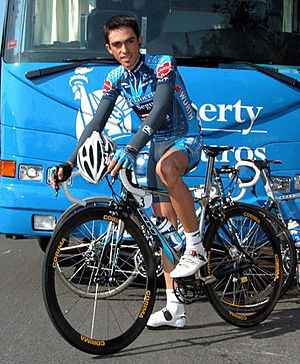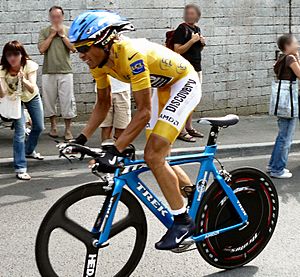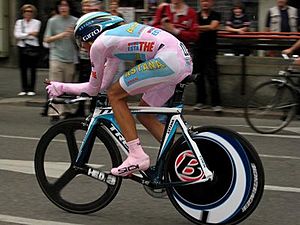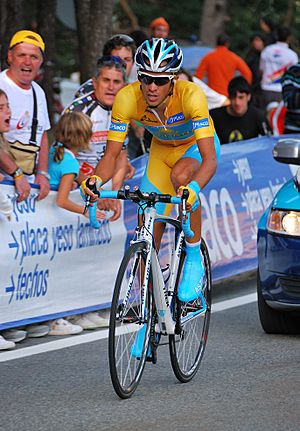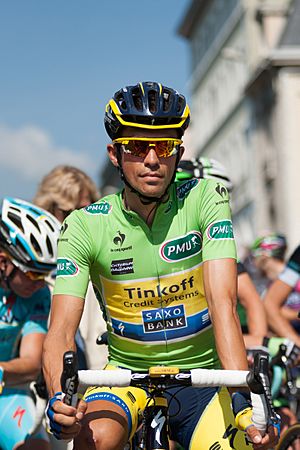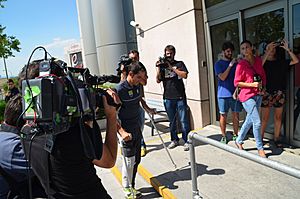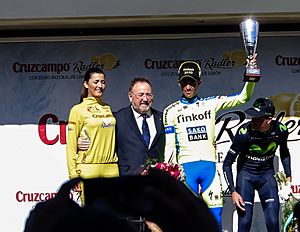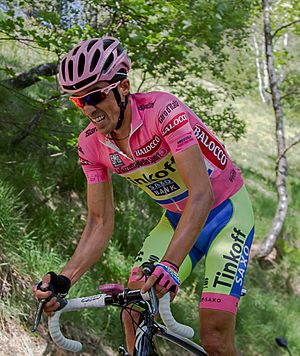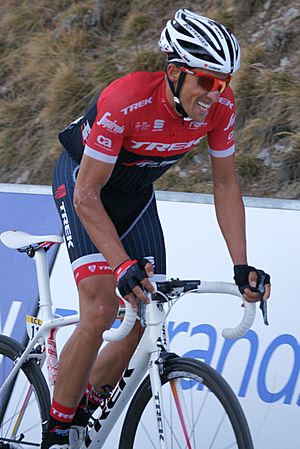Alberto Contador facts for kids
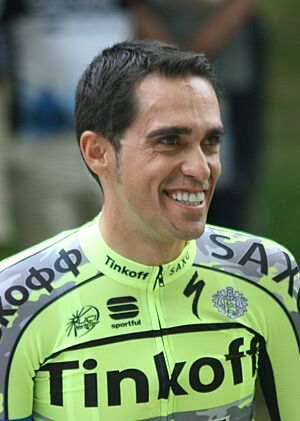
Contador at the 2015 Tour de France
|
|||
| Personal information | |||
|---|---|---|---|
| Full name | Alberto Contador Velasco | ||
| Nickname | El Pistolero | ||
| Born | 6 December 1982 Pinto, Madrid, Spain |
||
| Height | 1.76 m (5 ft 9+1⁄2 in) | ||
| Weight | 62 kg (137 lb; 9 st 11 lb) | ||
| Team information | |||
| Current team | Retired | ||
| Discipline | Road | ||
| Role | Rider | ||
| Rider type | All-rounder | ||
| Major wins | |||
|
|||
Alberto Contador Velasco (born 6 December 1982) is a Spanish former professional cyclist. He is one of the most successful riders of his time. He won the Tour de France twice (in 2007 and 2009). He also won the Giro d'Italia twice (in 2008 and 2015). Plus, he won the Vuelta a España three times (in 2008, 2012, and 2014).
Alberto is one of only seven cyclists who have won all three of cycling's biggest races, called Grand Tours. He is also one of only two riders to win all three more than once. He won the Vélo d'Or award, given to the best cyclist of the year, a record four times.
He was known as a strong rider who was excellent at climbing hills. On his best days, he was also very good at time trials. He was famous for being able to turn races around in his favor. A great example was during the 2012 Vuelta a España. He retired from professional cycling in 2017.
Contents
Early Life and Cycling Start
Alberto Contador was born on December 6, 1982, in Pinto, Madrid, Spain. He was the third of four children in his family. He had an older brother and sister, and a younger brother who has cerebral palsy.
Before cycling, Alberto played other sports like football and athletics. He found cycling when he was 14 years old, thanks to his older brother, Francisco Javier.
First Races and Nickname
When Alberto was 15, he started racing as an amateur in Spain. He joined the Real Velo Club Portillo from Madrid. He didn't win any races that year or the next. But he showed great talent, especially in climbing. People soon nicknamed him Pantani after Marco Pantani, a famous climber.
In 2000, he won his first races. He won several "mountains classification" prizes in big amateur events in Spain.
Turning Professional
At 16, Alberto left school and joined Iberdrola–Loinaz. This was a youth team run by Manolo Saiz. In 2001, he won the under-23 race at the Spanish National Time Trial Championships.
Alberto lives with his wife Macarena in Pinto when he is not racing. He loves birds and keeps canaries and goldfinches at home.
Professional Cycling Career
Starting with ONCE and Liberty Seguros (2003–2006)
Alberto Contador became a professional cyclist in 2003. He joined the ONCE team. In his first year, he won a stage in the 2003 Tour de Pologne. This was an individual time trial race.
In 2004, during a race, he felt unwell and fell. He had been having headaches for days. Doctors found a problem with his brain called a cavernoma. He had a risky surgery to fix it. He has a scar across the top of his head from the surgery.
Eight months after his surgery, in 2005, he won a stage at the 2005 Tour Down Under. He said this was the greatest win of his career. He then won the Setmana Catalana de Ciclisme overall. He also won a time trial in the 2005 Tour of the Basque Country.
In 2006, he won stages in the 2006 Tour de Romandie and 2006 Tour de Suisse. He was preparing for the 2006 Tour de France. However, he and his team were not allowed to start the Tour. This was due to a Spanish investigation into rule violations. He was later cleared by the UCI, cycling's main group.
Joining Discovery Channel (2007)
After the rule violation investigation, Alberto signed with the Discovery Channel team in 2007.
His first big win was the 2007 Paris–Nice race. He won it on the very last stage. His team worked hard to help him attack on the final climb. He held off other riders to win the race.
In the 2007 Tour de France, he won a mountain stage. He was in second place overall. The race leader was removed from the race before stage 17. This meant Alberto took the lead and the yellow jersey. He kept the yellow jersey in the final time trial. He won his first Tour de France by only 23 seconds. This was one of the closest finishes in Tour de France history.
Riding for Astana (2008–2010)
After Discovery Channel stopped sponsoring the team, Alberto moved to the Astana team for 2008.
2008: Winning Two Grand Tours
In 2008, the Tour de France organizers did not invite Astana to their races. This meant Alberto could not defend his Tour de France title. He won other races like the Vuelta a Castilla y León and the 2008 Tour of the Basque Country.
Then, his team got an invitation to the 2008 Giro d'Italia just one week before it started. Alberto was on a beach when he heard the news! Despite little preparation, he finished second in the first time trial. He took the pink jersey (leader's jersey) after stage 15. He won the Giro, becoming the first non-Italian to win since 1996.
Alberto then entered the 2008 Vuelta a España. He was a top favorite to win. He won stage 13 by attacking on the tough Angliru climb. This put him in the golden jersey as the race leader. He won stage 14 as well. He kept his lead and won his first Vuelta.
This made him the fifth cyclist ever to win all three Grand Tours. He was also the youngest at 25. He was the first Spaniard to achieve this. He also became only the third cyclist to win the Giro and the Vuelta in the same year. Later that year, he won the Vélo d'Or award again.
2009: Another Tour de France Win
In 2009, Lance Armstrong returned to cycling and joined Astana. Alberto was worried he might not be the team leader. But his manager assured him he would remain the main rider. Alberto decided to skip the Giro to focus on the Tour de France.
He started 2009 by winning the Volta ao Algarve race. He also won the Spanish National Time Trial Championships. This was his first national title as a professional.
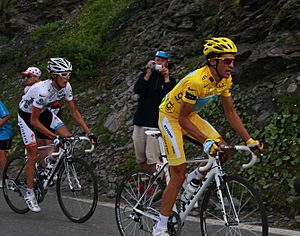
Alberto won Stage 15 of the Tour de France by riding alone to the finish. He took the yellow jersey. He then won the second time trial, increasing his lead. He won his second Tour de France on July 26. He finished over four minutes ahead of Andy Schleck.
Alberto had now won the last four Grand Tour races he entered. After the Tour, there were some disagreements between Alberto and Lance Armstrong. Alberto later said the experience was "psychologically tough."
2010: A Challenging Tour
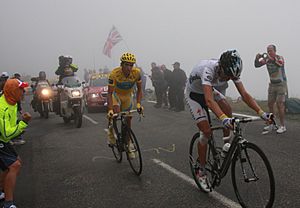
In 2010, Alberto won the 2010 Volta ao Algarve and his second 2010 Paris–Nice race. He was a favorite for the 2010 Tour de France, along with Andy Schleck.
On Stage 15, Andy Schleck had a mechanical problem with his bike chain. Alberto and another rider attacked immediately. They gained time on Schleck. Alberto took the yellow jersey with an eight-second lead. This move caused some debate among fans and commentators. Alberto later apologized for his actions. He went on to win the Tour de France by 39 seconds. This was the exact time he gained on Schleck on Stage 15.
Saxo Bank–SunGard (2011–2016)
Alberto signed a two-year contract with the Saxo Bank team for the 2011 season.
2011: Giro Victory and Tour Challenges
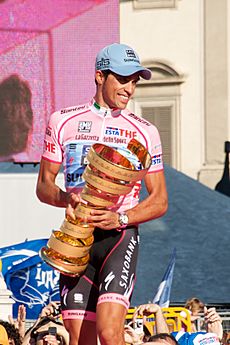
Alberto won the Vuelta a Murcia and the 2011 Volta a Catalunya. He then competed in the 2011 Giro d'Italia. He won the ninth stage on Mount Etna. This gave him the overall lead and the points classification lead. He extended his lead and won the race for the second time. This was his sixth Grand Tour win in a row.
He then competed in the 2011 Tour de France. He had several crashes early in the race. He also had an injured knee. He finished fifth overall, ending his streak of Grand Tour wins.
2012: Return to Racing and Vuelta Win
Alberto's early 2012 results were later removed due to rule violations. He was also suspended until August 5. After his suspension ended, he rejoined his team.
He competed in the 2012 Vuelta a España. He attacked many times in the mountains. On stage 17, he made a solo attack and won the stage. He took the lead from Joaquim Rodríguez. He held onto the lead and won his second Vuelta.
Later in 2012, he won the 2012 Milano–Torino race. This was his first time winning a single-day race.
2013: A Tough Season
In 2013, Alberto's only win was a stage in the 2013 Tour de San Luis. He finished third in 2013 Tirreno–Adriatico but got sick during the race. He finished fourth in the 2013 Tour de France, unable to match Chris Froome.
2014: Back to Winning Form
After a tough 2013, Alberto worked to regain his top form. He finished second in the 2014 Volta ao Algarve, winning a stage. He then won 2014 Tirreno–Adriatico, winning two stages. He also won the 2014 Tour of the Basque Country.
In the 2014 Tour de France, he was in much better shape. However, he crashed heavily on stage 10 and had to leave the race. He initially thought he would miss the 2014 Vuelta a España too. But he decided to race.
His Vuelta started well. He took the red jersey (leader's jersey) after the individual time trial. He won two mountain stages, strengthening his lead. He won his third Vuelta a España.
2015: Giro-Tour Double Attempt
In 2015, Alberto tried to win both the 2015 Giro d'Italia and the 2015 Tour de France. This is a very difficult challenge. He finished second in the 2015 Vuelta a Andalucía.
At the Giro d'Italia, he took the pink jersey on stage 5. He dislocated his shoulder the next day but kept racing. He lost the pink jersey briefly after a crash on stage 13. But he won it back in a long individual time trial on stage 14. He went on to win the Giro overall by almost two minutes. With this win, he joined Bernard Hinault as the only cyclists to have won multiple times at each Grand Tour.
For the Tour de France, he won a stage and the overall title at the Route du Sud. In the Tour, he struggled on the mountain stages. He also crashed on stage 17. He finished fifth overall. He said he had no regrets about trying to win both big races.
2016: Final Season with Saxo Bank
In March 2015, Alberto announced that 2016 would be his last season. He finished third in the 2016 Volta ao Algarve, winning the final stage. He was second in 2016 Paris–Nice and 2016 Volta a Catalunya. He then won the 2016 Tour of the Basque Country. After this win, he decided to postpone his retirement for another year.
He had a difficult 2016 Tour de France, crashing early on. He withdrew from the race on stage 9 due to a fever. In August, he won the 2016 Vuelta a Burgos. He finished fourth at the 2016 Vuelta a España.
Trek–Segafredo (2017)
Alberto joined the Trek–Segafredo team for his final season in 2017. He finished second in several races, including 2017 Vuelta a Andalucía, 2017 Paris–Nice, 2017 Volta a Catalunya, and 2017 Tour of the Basque Country.
In July, he rode his last 2017 Tour de France. He finished ninth overall. In August, he rode his final race as a professional, the 2017 Vuelta a España. He rode very aggressively, trying to win a stage. He won the final mountain stage on the famous Alto de l'Angliru. He also won the combativity award for being the most aggressive rider.
Alberto Contador raced his very last professional road race on October 21, 2017.
Rule Violations and Consequences
Past Investigations
In 2006, Alberto and some teammates were not allowed to compete in the Tour de France. This was because of an investigation in Spain. Alberto was later cleared of all charges.
In 2007, there were more questions about his name appearing in some documents from the investigation. Alberto denied any wrongdoing. He said he was on the "wrong team at the wrong time."
2010 Tour de France Incident
In September 2010, it was announced that a sample Alberto gave during the 2010 Tour de France had a tiny amount of a banned substance. He said it was due to contaminated food. Many people in cycling thought it was unlikely he would intentionally take such a small amount.
The cycling authorities looked into the matter. In early 2011, the Spanish Cycling Federation cleared him. However, the UCI (cycling's governing body) and the World Anti-Doping Agency appealed this decision.
In February 2012, a court ruled that Alberto was guilty of accidentally taking the substance. As a result, he was stripped of his 2010 Tour de France title. His wins after that race, including the 2011 Giro d'Italia, were also removed from his record. He was suspended from racing until August 2012.
After Racing
After retiring from racing, Alberto Contador and fellow cyclist Ivan Basso started a company called Aurum bikes in 2020.
In 2018, Alberto also became a cycling commentator for the television channel Eurosport.
Career Achievements
Major Wins
- 2002: 1st National Under-23 Time Trial
- 2003: 1st Stage 8 Tour de Pologne (Time Trial)
- 2005:
- 1st Overall Setmana Catalana de Ciclisme
- 1st Stage 5 Tour Down Under
- 1st Stage 5b Tour of the Basque Country (Time Trial)
- 2006: 1st Stage 8 Tour de Suisse
- 2007:
- 1st Overall Tour de France
- 1st Overall Paris–Nice
- 1st Overall Vuelta a Castilla y León
- 2008:
- 1st Overall Giro d'Italia
- 1st Overall Vuelta a España
- 1st Overall Tour of the Basque Country
- 1st Overall Vuelta a Castilla y León
- 2009:
- 1st National Time Trial Championships
- 1st Overall Tour de France
- 1st Overall Tour of the Basque Country
- 1st Overall Volta ao Algarve
- 2010:
- 1st Overall Paris–Nice
- 1st Overall Volta ao Algarve
- 1st Overall Vuelta a Castilla y León
- 2012:
- 1st Overall Vuelta a España
- 1st Milano–Torino
- 2014:
- 1st Overall Vuelta a España
- 1st Overall Tirreno–Adriatico
- 1st Overall Tour of the Basque Country
- 2015:
- 1st Overall Giro d'Italia
- 1st Overall Route du Sud
- 2016:
- 1st Overall Tour of the Basque Country
- 1st Overall Vuelta a Burgos
- 2017: 1st Stage 20 Vuelta a España
Awards
- Vélo d'Or: 2007, 2008, 2009, 2014
See also
 In Spanish: Alberto Contador para niños
In Spanish: Alberto Contador para niños
 | Laphonza Butler |
 | Daisy Bates |
 | Elizabeth Piper Ensley |


